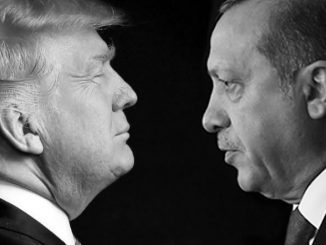
BY: CEMIL ERTEM*
British Prime Minister Theresa May’s speech at the Conservative Party conference last week indicated that the U.K. will pursue quite a rigid Brexit program. May’s speech not only points to a new path that whets the separation between the Conservative Party and Labour Party, but also to a crossroads that questions the Conservative Party’s traditional policy on the EU and will lead to a political division within the party. May said Article 50, which will initiate the U.K.’s secession from the EU, will take effect by March 2017 and touched on the rescission of the 1972 European Communities Act, adding, “Our laws will be made not in Brussels but in Westminster. The judges interpreting those laws will sit not in Luxembourg but in courts in this country. The authority of EU law in Britain will end.”
May’s remarks highlight that the U.K. will maintain its quest for markets and political sovereignty in accordance with its previous imperial spirit independently of the EU as in the past. Stressing that Brexit must make it easier for the U.K. to fight terrorism, deal with the migration issue and allow British companies to access markets, May said the U.K. will carry out political and economic operations in accordance with its national interests independently of the EU both during and after the Brexit process. How the U.S. will respond to the U.K.’s step is another question of debate. However, it has become obvious that the U.S.’s efforts to establish integration with the EU and U.K., including the long-sought Transatlantic Trade and Investment Partnership (TTIP) agreement, will remain unfulfilled. Last month, German Economic Affairs and Energy Minister Sigmar Gabriel, who is also the Chairman of the Social Democratic Party (SDP), said the TTIP actually failed. Coupled with the objection of the SDP’s left wing to the TTIP and Gabriel’s efforts, Germany applied an earlier date for the Comprehensive Economic and Trade Agreement (CETA) with Canada in order to accelerate the failure of the TTIP before it is launched. The TTIP’s dissolution even before it takes effect is a defeat that Democratic presidential nominee Hillary Clinton sustains before she is elected. This indicates the U.S. will also shift for itself without the EU and U.K. regardless of who will be the next president.
Well, how will this effect Turkey? This question is equivalent to the question of what kind of a European and foreign economic policy Turkey will pursue from now on. The U.K. and Germany’s return to new self-centered imperial policies like in the 19th century and the U.S.’s return to the same policies like in a significant part of the 20th century will cause Turkey to propose new policies in two major areas – foreign and economic policies on a regional and global scale. As President Recep Tayyip Erdoğan iterates at every occasion, Turkey is aware of this great change and will take steps to keep pace with it. In accordance with its desire to turn a new page in its relations with the EU, Turkey will put forth many issues, including the full membership process, refugee crisis and Cyprus question, on the agenda in the upcoming days. Turkey wants to discuss political and economic agreements and acceptances most of which were determined by the U.K. in the 19th and 20th centuries. For instance, to what extent is the Treaty of Lausanne binding in the current conjuncture? The Syrian civil war, the chain of terrorism and wars in the Middle East and terrorist organizations like Daesh are the consequences of the agreements signed in the early 20th century, including the Treaty of Lausanne which is a new colonial agreement taking Turkey as a center.
Now, as May states, the U.K. will develop its strategies on markets and energy areas, especially the Middle East and Caucasus, independently of the EU and U.S. during and after Brexit. As such, a new struggle for sovereignty will start in the vast territory spanning from Eastern Europe to the Caucasus, including Turkey. So, whether we like it or not, the Treaty of Lausanne, has come to an end. Moreover, there are major issues that Turkey must question in this regard.
The U.K. will not act so differently than from the beginning of the 20th century. The British Empire had two main objectives before signing the Treaty of Lausanne with Turkey. First, it wanted to control energy resources in Northern Iraq, especially in Mosul. Second, the control of the Bosporus Strait and Dardanelles would be taken away from Turkey and delegated to a commission that would consist of Turkey as a partner. However, apart from energy and straits, these objectives laid down many other negative conditions for Turkey. Turkey’s sixth President Fahri Korutürk writes, “Atatürk described the Treaty of Lausanne as an unprecedented political victory in the long history of the Ottoman Empire.” (…) It was a fact that the Treaty of Lausanne did not completely ensure the Turkish sovereignty in the geographical borders, consisting of the Black Sea Strait, Marmara Sea and Dardanelles, which we call the Turkish straits. This weakness on the straits disappeared as a result of the Montreux Conference and conventions (Fahri S. Korutürk, Montreux Straits Conference Proceedings Presentation Letter, Ankara University Faculty of Political Sciences Publication, 1976). Certainly, the Montreux Conference was held because of the U.K. and West’s fear of the Soviet Union and Turkey displayed no political will at the conference. Korutürk is quite right in the statement that the Treaty of Lausanne creates major security weakness for Turkey. This is because the period that gave rise to this treaty raised suspicions about security and political stability in the entirety of the region and created political stability there. As I mentioned above, this 20th century paradigm, which is the root of civil wars in the region and accompanying terrorist organizations like Daesh, imposes an economic policy which impoverishes the region, seizes its natural resources and colonizes it. As such, poverty in Turkey and the Middle East escalated and political stability in the region was ensured by military dictatorships. Therefore, Turkey will also bring economic policies into question. We need new-generation growth and development policies which highlight inclusive growth and can evaluate the region’s resources and wealth in accordance with the interests of the region’s people.
*Cemil Ertem is a Turkish columnist at Daily Sabah Turkish newspaper
(Published in Daily Sabah on Wednesday Oct. 5, 2016)



